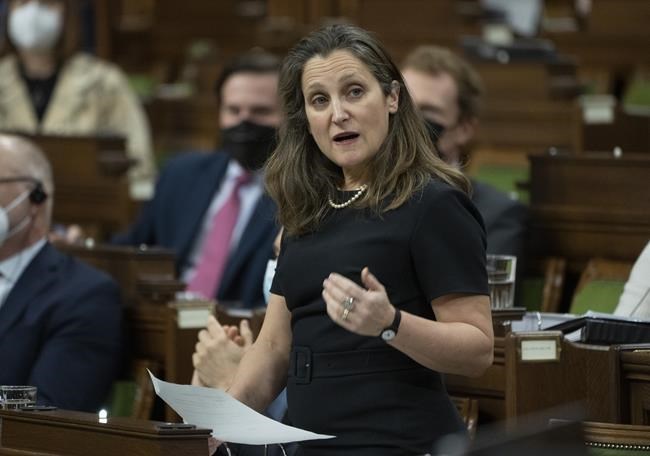OTTAWA — Finance Minister Chrystia Freeland says Canada is at a "tricky moment" as we near the two-year mark of a global pandemic that has left everyone tired, grouchy and grasping for signs of hope.
Freeland, who is also the deputy prime minister, told Liberals at a weekend virtual convention for the Ontario wing of the federal Liberal party that the party has always done best when it believes in the goodness of Canadians.
"I say that now because I think we're in a tricky moment right now, as a country," she said Friday night. "We're sort of poised between seizing optimism and seizing the future and giving way to frustration and despair."
Freeland did not reference the convoy of anti-vaccine demonstrators who have occupied downtown Ottawa for the last eight days and have spilled into protests in other cities. But they were heavy on the minds of many who spoke in the opening 90 minutes of the event.
Liberal party president Suzanne Cowan said she wanted to give an extra thank you to those joining the virtual event from Ottawa "and for all those impacted by this convoy."
"I know that it can be discouraging, makes you angry, frustrated," she said. "I don't know, insert your own word to the way you're feeling about the disturbances and what's been going on over the last week, but we will not be intimidated."
Hundreds of demonstrators remain encamped in downtown Ottawa, blocking streets with big rigs and camper vans, blaring horns at all hours of the day and night. Local residents have complained of being harassed and intimidated by convoy members, and the constant noise prompted a class-action lawsuit Friday, suing convoy leaders and truck drivers for $9.8 million.
The convoy leaders have said they will not leave until the government cedes to their demands that all COVID-19 restrictions be lifted, including vaccine mandates. Some have demanded the Liberal government be illegally ousted.
Freeland told the convention that Canadians as a whole have worked so hard throughout the pandemic to prove they are resilient and kind. But without a clear endgame on the table, emotions are running high.
"Two years of COVID, it's been a lot," she said. "And it's frustrating that there's not an absolutely obvious clear, for sure, finish line. And those things really weigh on people, and so people are tired and grouchy."
But she said politicians need to avoid the partisan instinct to take advantage of that anger to rile people up even more. Instead, she said, politicians should look to how well Canada has already recovered.
"Yes, there are still people who are vulnerable, of course, yes, there are people who have suffered," she said.
"But as a country, we actually have dug our way out of that huge hole and that says so much to me about where we can be and about our potential. I would just sort of say to us, you know, as people as Liberals, let's choose that optimism. Let's choose that faith in Canadians. Let's choose that, looking forward and not kind of wallowing in grouchiness."
Freeland said looking forwards, Liberals and all Canadians need to remember that the pandemic laid bare who the truly essential workers are in Canada, specifically pointing to health-care workers, grocery store clerks, and early childhood educators. She said many of them are themselves the least supported, earn the least money, or have the least amount of control over their working lives.
"COVID, especially that initial shock, it brought to all of us a real appreciation of those workers," she said.
"And I really, really believe it's our job as people, as Liberals, not to forget that. And to be sure that as a society, we value and support and lift up the people who we have really (leaned on.)"
This report by The Canadian Press was first published Feb. 4, 2022.
Mia Rabson, The Canadian Press



